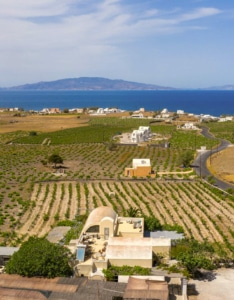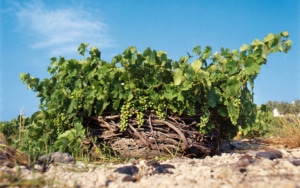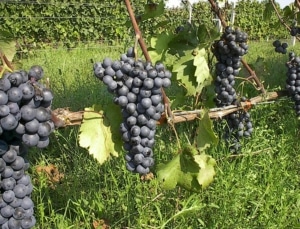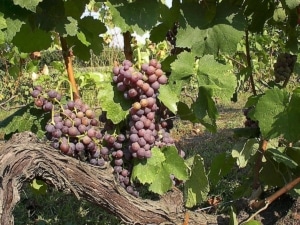DCPA NEWS CENTER
Enjoy the best stories and perspectives from the theatre world today.
Enjoy the best stories and perspectives from the theatre world today.
The ancient Greeks were definitely on to something.
First, you’ve got your Greek gods — fearsome, fanciful and fun to fantasize about.
Then, it’s the cradle of Western civilization complete with the birthplace of democracy, Western philosophy and literature, political science, the Olympic Games and…theatre.
You also have three stunning blue seas — Mediterranean, Aegean, Ionian — plus the longest coastline in the Mediterranean Basin.
And last but certainly not least…there’s wine. The high value placed on wine in ancient Greek culture is clear. They named a god after it! Dionysus is the Greek god of the grape harvest and winemaking.

Estate Argyros Vineyard in Santorini
While the first record of κρασί (or wine) in ancient Greece dates to around the 15th century BC, many wine historians claim that it may date to the Neolithic era some 6,500 years ago. In fact, according to the Grape Growing Guide, Greece has the oldest known grape wine remnants in the world and the earliest evidence of crushed grapes. It was in Greece where modern wine culture evolved from a purely religious use into everyday consumption, contributing to the economic prosperity of the region.
“No thing more excellent nor more valuable than wine was ever granted mankind by God.” — Plato, 400 BC
As the wine industry spread, commoners began to grow their own vineyards, using wine in trade for goods and services. While settlers took their vines, knowledge and techniques to new Greek colonies in Sicily, Italy and France, growers back home took advantage of the temperate climate and volcanic soil in Attica and Santorini.

Domaine Sigalas Vineyard in Santorini
As growers increased in number, so did exports. Wine merchants capitalized on Greece’s many coastal ports, making Greek wines among the most coveted in the region. Called “liquid gold” by the Romans, during the Renaissance, Italy passed laws curbing the sale of its own wine so that the upper echelon had exclusive access to Greek wine.
Perhaps it was capitalism at its best or simply a reverence for wine itself, but consumption extended from basic religious and household use to an essential element in funeral ceremonies, medicine and even cosmetology. Different wines were prescribed for a variety of ailments including digestive and respiratory issues, pain management, disinfectant, skin care and wrinkle reduction.
But for most connoisseurs — both then and now — the most common and enjoyable way to experience Greek wine is with friends. While recommendations vary, here are three contemporary Greek wines that both Wine & Spirit Magazine and The Grape Growing Guide agree on.

Assyrtiko grape vines
Assyrtiko (Ah-sear-tee-koh)
Produced on the Santorini Island
According to Wine Folly, Assyrtiko wine features strong fruit and mineral flavors such as passionfruit and flint. It is an extremely versatile wine, but it is “perfect for shellfish and, of course, Greece’s classic tomato-feta salad.”

Agiorgitiko grape vines
Agiorgitiko (Ah-your-yeek-tee-ko)
Produced in the Nemea region
Agiorgitiko grapes produce a wide variety of red wines, the most popular being full-bodied reds. Wine Folly says, “With subtle flavors of nutmeg and cinnamon, Agiorgitiko pairs wonderfully with roasted meats, tomato sauces, and spiced cuisines from the Middle East to India.”

Moschofilero grape vines
Moschofilero (Mo-show-feel-er-oh)
Produced in both the Peloponnese and Mantina regions
This aromatic white wine combines bright, citrus flavors with floral potpourri. According to Wine Folly, this wine would pair well with light bites and cheeses, such as “cucumber sandwiches, lox with cream cheese and capers, or fruit tarts.”
Available at Mazevo Denver and Total Wines
Γεια! Cheers!
